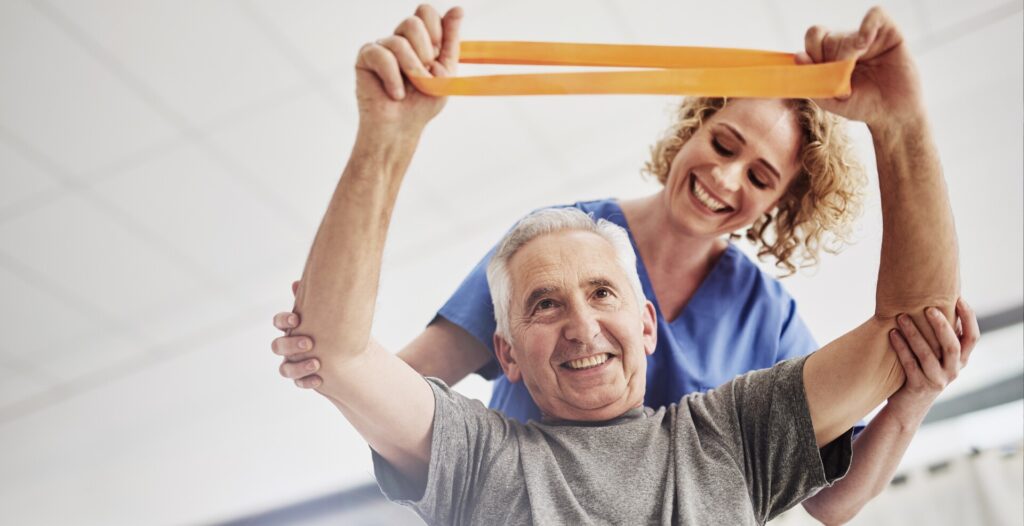
May is National Physical Fitness and Sports Month!
It’s helpful that May is set aside to create awareness of the health benefits of not being a couch potato…but EVERY month is a good month to take it seriously.
As we age, staying active is essential for maintaining health, independence, and a high quality of life. For seniors, regular physical activity can help prevent many of the physical and mental declines associated with aging. From stronger bones and better balance to improved mood and sharper cognition, the benefits of movement go far beyond just staying in shape. Yet, many older adults underestimate the importance of consistent activity or worry that it’s too late to start. The truth is, it’s never too late to move more and feel better.
Here are some helpful tips and evidence-based information about why staying active is vital for seniors and how to make it part of everyday life.
Physical Benefits of an Active Lifestyle
Among more than 501,000 people ages 40 to 69 followed for at least 10 years, those who did activities such as swimming, cycling or playing strenuous sports had a 35 percent lower risk of dementia compared with those who maintained low levels of activity. This study, reported in Neurology, is one of many showing the benefits of physical activity. Others include:
Improved Heart Health
Regular physical activity strengthens the heart and improves circulation, reducing the risk of heart disease, high blood pressure, and stroke. Even moderate activities like walking or gardening can improve cardiovascular health over time.
Better Bone Density and Joint Health
Weight-bearing exercises, such as walking or light strength training, can help maintain or even improve bone density, reducing the risk of osteoporosis. Staying active also helps lubricate joints and ease stiffness, which is particularly helpful for seniors with arthritis.
Stronger Muscles, Better Balance/Coordination
Maintaining muscle strength and coordination is crucial for preventing falls – a leading cause of injury among older adults. Exercises like tai chi, balance drills, and resistance band workouts can greatly improve stability and lower fall risk.
Enhanced Flexibility and Mobility
Regular stretching and range-of-motion exercises keep muscles supple and joints limber. This helps seniors remain mobile, get around more easily, and perform daily tasks without discomfort.
Immunity Boost
A 2018 study linked moderate exercise with a lower incidence of acute respiratory illness and fewer sick days off work. The exact way exercise supports immunity is not entirely known, but the results are indisputable.
Weight Management
Physical activity plays an important role in managing weight and reducing the risk of obesity-related conditions such as type 2 diabetes and certain cancers.
A single session of moderate to vigorous physical activity provides immediate benefits for your health. In addition, regular physical activity helps prevent many chronic diseases.
— CDC
Mental and Emotional Benefits
Mental decline is a top concern for aging seniors – and their families. Many studies have shown how physical activity impacts long-term brain health. Reducing the risk of developing dementia and depression alone are compelling incentives. Others include:
Boosted Mood and Lower Stress Levels
Exercise naturally boosts endorphins — the body’s “feel good” chemicals. Seniors who stay active are more likely to experience improved mood, reduced anxiety, and a greater sense of well-being.
Better Sleep
Staying active during the day helps regulate sleep patterns and can lead to more restful, deeper sleep at night, which is often a concern for older adults.
Sharper Mental Focus and Reduced Risk of Cognitive Decline
Studies show that physical activity supports brain health by improving blood flow and stimulating the growth of new neural connections. Seniors who exercise regularly have a lower risk of developing Alzheimer’s disease and other forms of dementia.
Increased Social Engagement
Group exercise classes, walking clubs, or dance lessons offer both physical and social benefits. They provide opportunities to connect with others, which can reduce feelings of loneliness or isolation.
Getting Started: Tips for Seniors
Consult a Healthcare Provider
Before starting a new exercise regimen, it’s wise to consult professionals like ones here at Health Care Connectors, especially if there are any existing health conditions. Only an experienced professional can recommend safe activities based on individual needs.
Start Slow and Progress Gradually
The key is consistency, not intensity. Start with 10-minute walks or gentle stretching, then gradually build up to longer and more challenging sessions. Overexertion can lead to injury or burnout, so it’s best to ease in.
Choose Enjoyable Activities
Seniors are more likely to stick with exercise routines that they enjoy. Whether it’s dancing, swimming, yoga, gardening, or walking the dog, doing something fun adds motivation and makes exercise feel less like a chore.
Incorporate Variety
Mixing up activities can keep things interesting and target different parts of the body. Include aerobic, strength, flexibility, and balance exercises throughout the week.
Make It a Social Habit
Joining an exercise group or scheduling walks with a friend adds accountability and makes fitness more enjoyable. It also creates new opportunities for connection and conversation.
Set Realistic Goals
Goals should be specific, measurable, and achievable. For example, “I will walk for 15 minutes three times this week” is more effective than a vague “I want to get in shape.”
Stay Safe
Use supportive shoes, stay hydrated, avoid outdoor activities in extreme temperatures, and be mindful of terrain and obstacles to reduce fall risks.
Celebrate Progress
Every bit of progress – whether it’s walking a little farther, standing a little taller, or feeling more energetic – is worth celebrating. Positive reinforcement helps reinforce the habit.
Overcoming Common Barriers
Some seniors avoid physical activity due to pain, fatigue, or fear of injury. Others may feel too old or unmotivated. Addressing these barriers with a tailored, supportive approach can make all the difference.
SOURCES:
AARP
Centers for Disease Control
The National Council on Aging
National Institutes of Health